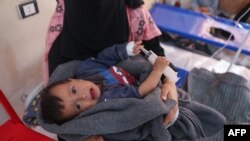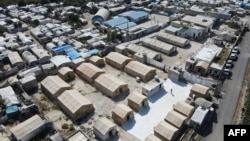The United Nations appealed Tuesday for more money and access to needy Syrians, as winter sets in and a cholera outbreak strains limited resources.
“We are just weeks away from another winter in Syria, and a painfully familiar scenario will soon unfold again,” U.N. Humanitarian Director of Operations and Advocacy Reena Ghelani told a meeting of the Security Council. “Snowstorms, subzero temperatures, strong winds, rains and flooding are expected to hit soon.”
The U.N. says 14.6 million Syrians need humanitarian assistance – more than at any other time in its 11 years of civil war. At least 12 million are food insecure and malnutrition is on the rise, as families cope with a crippling economic crisis that has reduced 90% of the population to living below the poverty line. Drought conditions also have led to the poorest wheat harvest since the war’s start.
Ghelani said severe fuel and electricity shortages will make it very hard for families to keep warm this winter.
“This year, the number of people who need winterization assistance has increased by a staggering 30% across the country compared to the previous year,” she said. “In the northwest, some 2 million people depend on winter assistance to meet their most basic needs.”
She said most are women and children living in camps with limited or no access to heating, electricity, water or sewage disposal.
Without clean water in several areas, cholera has recently surfaced, spreading rapidly and now confirmed in all 14 governorates. There have been at least 24,000 suspected cases and at least 80 people have died from the waterborne disease.
“The equation is simple: When people drink the same contaminated water that they use to irrigate their crops, and when they do not have sufficient water to practice proper hygiene, waterborne diseases spread, causing people, especially children, to fall ill and sometimes die,” Ghelani told the council.
The U.N. needs $34.4 million to tackle cholera for the next three months, while its other humanitarian operations in the country remain significantly underfunded with just two months left in the year.
Aid renewal
Compounding the current crisis is the life-or-death question mark that hangs over U.N. aid operations in the northwest of the country.
The Security Council authorization for the eight-year-old operation that moves aid from Turkey through the Bab al-Hawa border crossing into northwest Syria will expire in early January, just as the harshest weather takes hold.
More than 4 million people live in northwest Syria, in an area that is outside government control. Humanitarians reach about 2.4 million of them each month by bringing aid convoys through the border crossing.
Russia has long sought to end the operation, which Damascus does not like, and has succeeded in using its veto to narrow the operation’s reach since 2019.
During the last renewal in July, Russia refused a one-year extension, complicating logistics planning and hiring for the mission. Now the already difficult negotiations will take place against the backdrop of council divisions intensified by the war in Ukraine.
The U.N.’s Ghelani said humanitarians need both access from Turkey and from within Syria across conflict lines.
“A non-renewal of the authorization to carry out cross-border humanitarian assistance at the peak of winter, and in the middle of a cholera response, could cut off access to millions of people in the northwest just when they need it most,” she warned.





